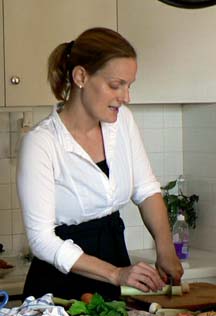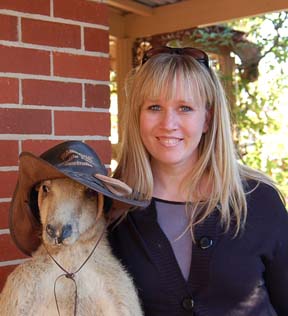

ne of the many great features of writing is its portability. You can do it at home or on the train, in a notebook or on a laptop, with one eye watching the kids or one ear listening for the phone. In fact, many writers start out with their story ideas by just scribbling away whenever and wherever their muse strikes.
Unfortunately, what starts out as portability can soon turn into an unhealthy blurring of the boundaries between work and life. Suddenly all of those notes on cocktail napkins start to irritate your partner, or the other mothers at playgroup aren't impressed with yet another late play date because you had to revise some copy. And let's not even talk about those friends and relatives who don't get holiday cards anymore because you're too busy meeting deadlines to write out a few lines.
So how do you achieve a greater balance between your working life and your personal life?
Obviously, the answers will be different for everyone, but in general, four handy hints seem to have dramatic effects for anyone who follows them:
- Know your priorities
- Develop other hobbies
- Reconnect with family and friends
- Get out of the house and away from work
They may not be a perfect recipe, but they will certainly result in better balance (not to mention a healthier life).
Know Your Priorities
When someone else tells you to figure out your priorities it's usually in an ominous tone and provoked by an incident in which you've neglected something that they think should be more important to you. No more! To make the most of both your work and your life you need to figure out what is most important to you, despite how unpopular it might be with others.
For Jessica Brogan, a writer of opinion and travel pieces in Neuchatel, Switzerland, having the freedom to write when and where she wants actually became a problem. With no office to escape to, she found it difficult to settle into the life of a full time writer. Brogan explains “Ironically, it's difficult to achieve a work-life balance when you first start writing… scheduling myself is the main problem. I have the life--but not the balance.” To combat unproductive days, Brogan has made it a priority to schedule a certain number of hours per day to write, with no restrictions on when they should occur.
Julie Galante, a self-professed freelance writer and “international dilettante” who has lived and worked in Italy, Germany and now Zurich, Switzerland, experiences a similar problem with her scheduling. “For me as a freelance writer the most stressful aspect is trying to build up the right mix of projects,” she says. “It's hard to know where to best invest my time and effort… sometimes having too many options leads me to inactivity and then it's stressful to not be moving forward.” For Galante, acknowledging that her writing will be sporadic and devoting her quiet afternoons to pieces that are approaching deadlines has helped prioritize the other hours of her days, giving her a work-life balance that she might otherwise be without.

Meeting deadlines early also provides Lagarde with the peace of mind to enjoy making gourmet meals
mid-day...
(Photo of Riana Lagarde)
Of course, not every writer has too much life in her work-life balance. For Riana Lagarde, a travel writer in the South of France, deciding that she had to slow down and do less was the answer to her imbalance. Lagarde now keeps an index card of 20 things that she loves to do in her planner so that during stressful writing times she can remember her love of flea markets and bubble baths. Meeting deadlines early also provides Lagarde with the peace of mind to enjoy making gourmet meals mid-day, if the desire takes hold.
While it may seem cold or callous to decide that your deadline is more important than making snacks for your child's nursery school class, a work-life balance need not be quite so black and white. Can you pop down to the supermarket and pick up fruit and juice boxes instead of labor over homemade treats? If the answer is yes, then you've just taken a great step towards reclaiming some time to yourself for however you want to spend it.
Develop Other Hobbies
Both the blessing and curse of writing is that though it may be a career, it's usually also a hobby. To make sure that all of your spare hours (read: not allocated to work) aren't taken up with writing, begin to develop other hobbies. For Andrea Botham, a mature student of International (Print) Journalism and an intern at Newsweek International Magazine in London, dancing is a means of getting away from the desk and doing something different. “I love to dance, out with friends, by myself, in a class, it doesn't matter,” says Botham, who describes dancing as “cathartic bliss”.

“...to see life again through a four year old's eyes...”
(Photo of Andrea Botham with Kangaroo friend)
In fact, most women who need to realign their work-life balance describe the hobbies to which they turn as cathartic, energizing and inspiring. After all, with such limited time available why waste any of it on activities which aren't stimulating? Galante and Lagarde both turn to painting when they need some time to themselves - while Galante sticks to canvases, Lagarde prefers her walls - and both also cite the culinary adventures of home cooking as favorite pastimes. For Brogan, reading is also a helpful hobby as it allows her to learn new things that usually make their way into her writing later.
No matter what hobby you decide to pursue, be it flower arranging, rock climbing or mastering your Playstation, no doubt you will find ideas in your activity that will encourage your writing at a later time. Particularly for those who believe in “writing what you know”, remember that a corollary can be stated as “the more you know the more you can write”, so once you begin to explore new interests and activities you may find yourself better prepared to tackle any number of new subjects in your writing. Talk about making the most of your time!
Reconnect with Family and Friends
Not surprisingly when you do emerge from your writing family and friends will be clamoring for your attention so go ahead and give them some of it, but don't get caught up feeling guilty about your work, and certainly don't feel that you owe anyone anything. Of course, this is usually ‘easier said than done.’
For real quality time, invest in activities that will leave you smiling at the end of it. Spend an afternoon making collages with your daughter or shopping with your mother, or an evening out on the town with your partner. Botham enjoys spending time with her young nephew as it allows her “to see life again through a four year old's eyes,” as well as spending time relaxing with her husband. Lagarde also cites family time as a favorite way of spending her non-writing hours. “I spend copious amounts of time with my family and for that I am very thankful and feel blessed,” she says, a sentiment no doubt shared by every woman able to make time to spend with loved ones.

“...sometimes having too many options leads me to inactivity and then it's stressful to not be moving forward.”
(Photo of Julie Galante with a Japanese pickle!)
Get Out of the House and Away from Work
As a last resort, if you are simply incapable of remaining near your writing space and doing anything other than working, get yourself out of the house. Experience life in all of its splendor--with its sights, smells, and strangers just waiting to become friends--and do it in person and away from the comfort of your home and home office. Galante and Botham both love to travel and experience new cultures, and Lagarde also loves to entertain travelers who have good stories to tell.
Of course, you don't have to trek to the other side of the world to meet new people and see new places. Taking your morning jog or afternoon walk will literally lead you to new forks in the road, and they might just give you a fresh perspective on an old frustration. Brogan loves to run outside, explaining, “I usually conjure up the best thoughts while running, I go over the sound of my words in my head as if I were reading them aloud.” She goes on to muse that “while I'm running or walking I can collect my thoughts, or evade them--whichever I prefer.” Lagarde finds a long walk without a cell phone can provide the same experience, while Galante is an advocate of yoga as stress relief.
Regardless of which form of exercise you prefer, just changing the scenery and working up a sweat outdoors is usually a powerful energizer and a great motivator for feeling like you've earned a few hours at the keyboard later.

“I usually conjure up the best thoughts while running...”
(Photo of Jessica Brogan)
While a hallmark of modern life seems to be a frenetic pace, writers in particular can fall victim to working at all hours. The ease with which we can pick up a pen or open up a new document can be wonderful for our careers, but not so great for our personal lives. If you've found that your work-life balance has begun teetering too far to one side, don't berate yourself about the situation--you'll only be wasting your time and energy. Instead, commit to a new work-life balance and begin to live it. Your career, your family, your friends and most importantly, your own health will thank you for it!
-------------
Beth Morrissey has written well over 200 articles on various subjects, in publications around the world. She's been a Freelance Writer for 3 years, with experience in print and electronic publications. Beth is an editor of various educational materials including essays, reports and brochures, two organizational newsletters and children's books. She's also experienced in American and British English copy-editing, proofreading, as well as content editing.
Email: beth.morrissey@bethmorrissey.com
Beth Morrissey's articles on WOW!:
Review: Freelance Writing Newsletters
How 2: Create Your Own Unique Workspace
|